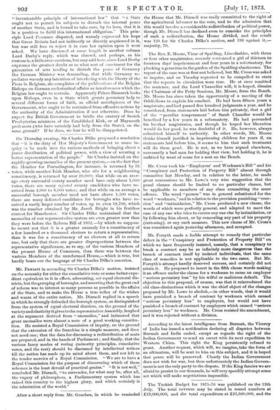On Thursday evening, Sir Charles Dllke proposed a resolution that
"it is the duty of Her Majesty's Government to cause in- quiry to be made into the various methods of bringing about a juster distribution of political power, with a view of securing a better representation of the people." Sir Charles insisted on the rapidly-growing anomalies of the present system,—on the fact that the Member for Portarlington, for instance, is returned by 76 votes, while another Irish Member, who sits for a neighbouring constituency, is returned by over 20,000; that while on an aver- age every successful county member need have only about 1,000 votes, there are many rejected county candidates who have re- ceived from 4,000 to 8,000 votes ; and that while on an average a successful borough member need not have above 1,500 votes, there are many defeated candidates for boroughs who have re- ceived a vastly larger number of votes, up to even 18,700, which was the number obtained by Mr. Jacob Bright in his fruitless contest for Manchester. Sir Charles Dilke maintained that the anomalies of our representative system are even greater now than they were before the Reform Bill of 1832,—by which we suppose he meant not that it is a greater anomaly for a constituency of a few hundred or a thousand electors to return a representative, than it was for a constituency of no electors at all to return one, but only that there are greater disproportions between the representative significance, so to say, of the various Members of the present House of Commons, than there was between the various Members of the unreformed House,—which is true, but hardly bears out the language of Sir Charles Mike's assertion.


































 Previous page
Previous page